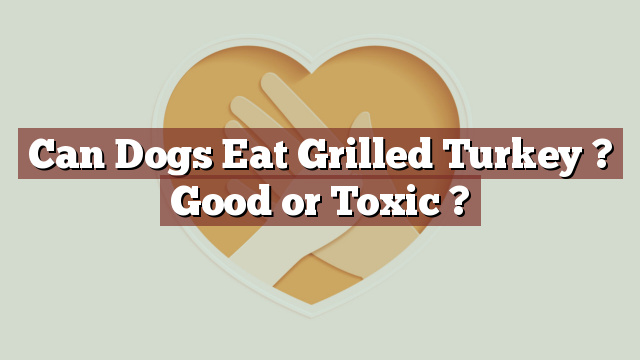Can Dogs Eat Grilled Turkey? Good or Toxic?
It is of utmost importance for pet owners to be aware of what foods are safe for their furry friends. One popular food often found on the dinner table is grilled turkey. But can dogs eat grilled turkey? Is it safe or toxic for them? Let’s delve into the nutritional value, potential risks, and benefits of dogs consuming this savory dish.
Nutritional Value of Grilled Turkey for Dogs
Grilled turkey is a lean source of protein that can be beneficial for dogs. It is low in fat and rich in essential nutrients such as vitamins B3, B6, and B12, as well as minerals like zinc and selenium. These nutrients contribute to healthy skin, a shiny coat, and a strong immune system in our canine companions.
Is Grilled Turkey Safe or Toxic for Dogs?
Yes, dogs can eat grilled turkey, but with caution. While turkey itself is safe for dogs to consume, certain elements may pose potential hazards. Dogs should only be given plain, unseasoned turkey without any bones, skin, or added spices. These components can cause choking, gastrointestinal obstruction, or even pancreatitis in dogs. It is vital to remove any excess fat and ensure the turkey is fully cooked to prevent harmful bacteria such as Salmonella or Campylobacter from affecting your pet.
Veterinary professionals suggest feeding small amounts of grilled turkey as an occasional treat rather than incorporating it into their regular diet. Always remember that moderation is key when it comes to introducing new foods into your dog’s diet.
Potential Risks and Benefits of Dogs Eating Grilled Turkey
While grilled turkey can be a healthy addition to a dog’s diet, it is crucial to understand the potential risks involved. As mentioned earlier, bones can present a choking hazard and may splinter, causing harm to the digestive tract. Moreover, the skin and excessive fat can lead to gastrointestinal upset, obesity, or pancreatitis in dogs.
On the flip side, the lean protein in grilled turkey can aid in muscle development and provide energy. The vitamins and minerals present can support various bodily functions and contribute to overall well-being. However, it is essential to maintain a balanced diet for your dog and consult your veterinarian before making any significant dietary changes.
What to Do If Your Dog Eats Grilled Turkey?
If your dog accidentally consumes grilled turkey, it is important to assess the situation promptly. If the turkey was seasoned or contained bones, contact your veterinarian immediately. They will guide you through the necessary steps, which may include inducing vomiting or other appropriate measures to ensure your dog’s safety and well-being.
Conclusion: Grilled Turkey Can Be Safe but with Proper Precautions
In conclusion, dogs can eat grilled turkey, but certain precautions must be taken. Plain, unseasoned turkey without bones or skin can be a healthy treat for dogs in moderation. However, it is essential to remove any potential hazards and consult with a veterinarian before introducing new foods into your pet’s diet. By following these guidelines, you can enjoy sharing a delicious grilled turkey treat with your furry companion while keeping them safe and healthy.
Thank you for investing your time in exploring [page_title] on Can-Eat.org. Our goal is to provide readers like you with thorough and reliable information about various dietary topics. Each article, including [page_title], stems from diligent research and a passion for understanding the nuances of our food choices. We believe that knowledge is a vital step towards making informed and healthy decisions. However, while "[page_title]" sheds light on its specific topic, it's crucial to remember that everyone's body reacts differently to foods and dietary changes. What might be beneficial for one person could have different effects on another. Before you consider integrating suggestions or insights from "[page_title]" into your diet, it's always wise to consult with a nutritionist or healthcare professional. Their specialized knowledge ensures that you're making choices best suited to your individual health needs. As you navigate [page_title], be mindful of potential allergies, intolerances, or unique dietary requirements you may have. No singular article can capture the vast diversity of human health, and individualized guidance is invaluable. The content provided in [page_title] serves as a general guide. It is not, by any means, a substitute for personalized medical or nutritional advice. Your health should always be the top priority, and professional guidance is the best path forward. In your journey towards a balanced and nutritious lifestyle, we hope that [page_title] serves as a helpful stepping stone. Remember, informed decisions lead to healthier outcomes. Thank you for trusting Can-Eat.org. Continue exploring, learning, and prioritizing your health. Cheers to a well-informed and healthier future!

